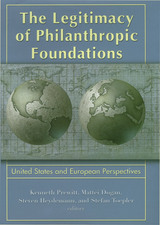2 books by Heydemann, Steven

Legitimacy of Philanthropic Foundations
United States and European Perspectives
Kenneth Prewitt
Russell Sage Foundation, 2006
Though privately controlled, foundations perform essential roles that serve society at large. They spearhead some of the world's largest and most innovative initiatives in science, health, education, and the arts, fulfilling important needs that could not be addressed adequately in the marketplace or the public sector. Still, many people have little understanding of what foundations do and how they continue to earn public endorsement. The Legitimacy of Philanthropic Foundations provides a thorough examination of why foundations exist and the varied purposes they serve in contemporary democratic societies. The Legitimacy of Philanthropic Foundations looks at foundations in the United States and Europe to examine their relationship to the state, the market, and civil society. Peter Frumkin argues that unlike elected officials, who must often shy away from topics that could spark political opposition, and corporate officers, who must meet bottom-line priorities, foundations can independently tackle sensitive issues of public importance. Kenneth Prewitt argues that foundations embody elements of classical liberalism, such as individual autonomy and limited government interference in private matters and achieve legitimacy by putting private wealth to work for the public good. Others argue that foundations achieve legitimacy by redistributing wealth from the pockets of rich philanthropists to the poor. But Julian Wolpert finds that foundations do not redistribute money directly to the poor as much as many people believe. Instead, many foundations focus their efforts on education, health, and scientific research, making investments that benefit society in the long-term, and focusing on farsighted issues that a myopic electorate would not have patience to permit its government to address. Originating from private fortunes but working for the public good, independently managed but subject to legal prescriptions, philanthropic foundations occupy a unique space somewhere between the public and private sectors. The Legitimacy of Philanthropic Foundations places foundations in a broad social and historical context, improving our understanding of one of society's most influential—and least understood—organizational forms.
[more]

Making Sense of the Arab State
Steven Heydemann and Marc Lynch, Editors
University of Michigan Press, 2024
No region in the world has been more hostile to democracy, more dominated by military and security institutions, or weaker on economic development and inclusive governance than the Middle East. Why have Arab states been so oppressively strong in some areas but so devastatingly weak in others? How do those patterns affect politics, economics, and society across the region? The state stands at the center of the analysis of politics in the Middle East, but has rarely been the primary focus of systematic theoretical analysis.
Making Sense of the Arab State brings together top scholars from diverse theoretical orientations to address some of the most critically important questions facing the region today. The authors grapple with enduring questions such as the uneven development of state capacity, the failures of developmentalism and governance, the centrality of regime security and survival concerns, the excesses of surveillance and control, and the increasing personalization of power. Making Sense of the Arab State will be a must-read for scholars of the Middle East and of comparative politics more broadly.
Making Sense of the Arab State brings together top scholars from diverse theoretical orientations to address some of the most critically important questions facing the region today. The authors grapple with enduring questions such as the uneven development of state capacity, the failures of developmentalism and governance, the centrality of regime security and survival concerns, the excesses of surveillance and control, and the increasing personalization of power. Making Sense of the Arab State will be a must-read for scholars of the Middle East and of comparative politics more broadly.
[more]
READERS
Browse our collection.
PUBLISHERS
See BiblioVault's publisher services.
STUDENT SERVICES
Files for college accessibility offices.
UChicago Accessibility Resources
home | accessibility | search | about | contact us
BiblioVault ® 2001 - 2024
The University of Chicago Press









